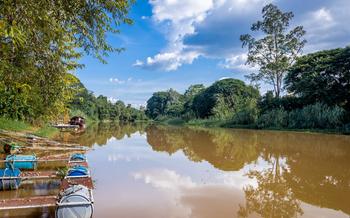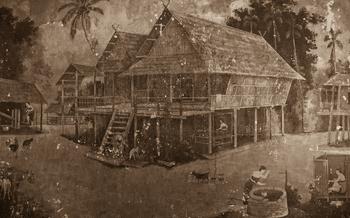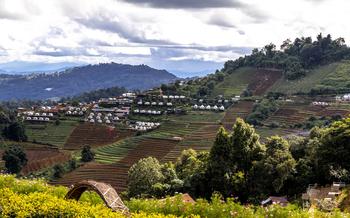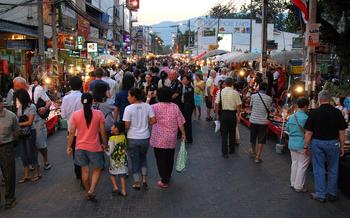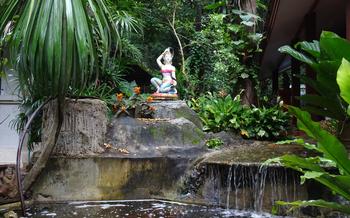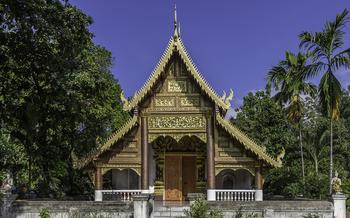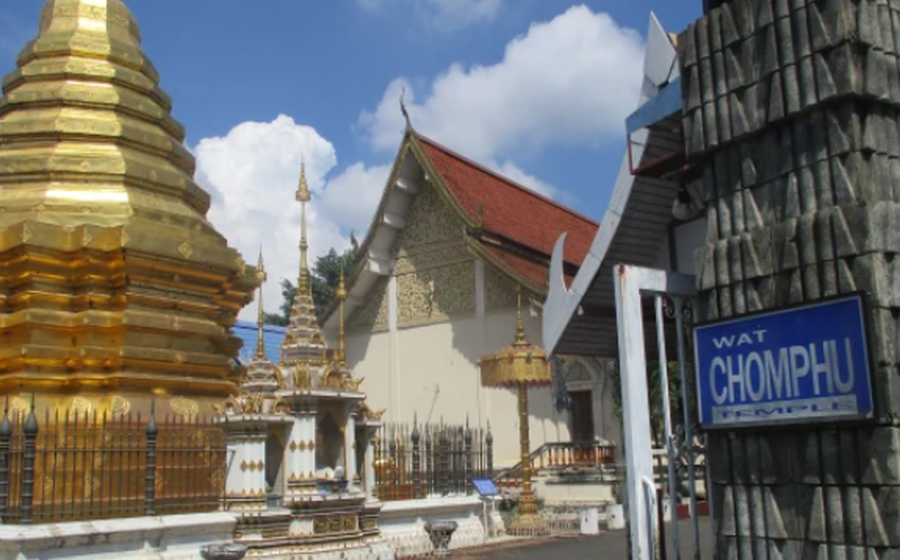
Wat Chomphu
- Explore the Ancient Ruins
- Immerse in Breathtaking Landscapes
- Discover the Nagas and Mythical Creatures
- Experience the Local Culture
- Learn About the Temple's Restoration
- Visit the Surrounding Villages
- Take a Guided Tour
- Plan Your Visit
- Capture the Beauty
- Respectful Etiquette
- Insider Tip: Hidden Gem Nearby
Explore the Ancient Ruins
Uncover the captivating history of Wat Chomphu by delving into the ancient ruins that surround the temple grounds. These remnants of a bygone era offer a glimpse into the rich cultural heritage of Thailand and provide a fascinating exploration for history enthusiasts.
The ruins consist of various structures, including crumbling walls, ancient stupas, and intricate carvings that have withstood the test of time. Each structure holds its own significance, telling tales of the temple's past and the lives of its former inhabitants.
To fully appreciate the ruins, consider booking a guided tour. Knowledgeable guides can provide insights into the history and significance of each structure, bringing the past to life. Alternatively, explore at your own pace, allowing your imagination to run wild as you piece together the stories etched in stone.
One of the most captivating aspects of the ruins is the presence of ancient Buddha images, some of which have been weathered by time, adding to their mystique. These sacred figures evoke a sense of serenity and spirituality, inviting visitors to contemplate the teachings of Buddhism and the enduring legacy of this ancient religion.
As you wander among the ruins, keep an eye out for hidden corners and secluded spots that may reveal hidden treasures or offer unique perspectives. The ruins of Wat Chomphu are a testament to the enduring power of history and the resilience of the human spirit.
Immerse in Breathtaking Landscapes
Wat Chomphu is nestled amidst a stunning natural landscape that complements its architectural beauty. The temple grounds offer panoramic views that stretch across lush green valleys and distant mountain ranges. Visitors can wander through serene gardens, admire the vibrant flora, and capture picturesque moments from various vantage points. The temple's elevated location provides a breathtaking backdrop for sunset photography, allowing visitors to witness the sky ablaze with vibrant hues as the sun dips below the horizon. For those seeking tranquility and a connection with nature, Wat Chomphu offers a sanctuary of peace and serenity, where the beauty of the surroundings blends harmoniously with the spiritual essence of the temple.
Discover the Nagas and Mythical Creatures
Wat Chomphu is adorned with an array of intricate naga sculptures and mythical creatures that hold deep cultural and religious significance. These mythical beings, often depicted as serpents or dragons, are revered in Thai mythology and Buddhism. The nagas are believed to be protectors of water and bringers of rain, symbolizing fertility and prosperity. Their presence at the temple serves as a reminder of the interconnectedness between the natural world and the spiritual realm.
Within the temple grounds, you'll find naga sculptures of various sizes and forms, each with its unique characteristics. Some are depicted as fierce guardians with their heads raised and fangs bared, while others appear more serene and graceful. Pay attention to the intricate details of their scales, fins, and elaborate headdresses, which showcase the skill and artistry of the ancient craftsmen.
As you explore the temple further, you may also encounter sculptures of other mythical creatures, such as garudas, half-human, half-bird beings, and yakshas, powerful nature spirits. These figures represent various aspects of Buddhist cosmology and mythology, adding to the temple's rich symbolism and storytelling.
Discover the stories and legends associated with these mythical creatures by engaging with local guides or reading up on Thai mythology. Their presence at Wat Chomphu offers a glimpse into the vibrant and imaginative world of Thai folklore, where the sacred and the supernatural intertwine.
Experience the Local Culture
A visit to Wat Chomphu offers a unique opportunity to immerse yourself in the local culture of Chiang Mai. Engage with the friendly monks who reside at the temple, who are always eager to share their knowledge and insights about Buddhism and Thai culture. Observe the daily rituals and ceremonies that take place within the temple grounds, offering a glimpse into the deep spirituality of the Thai people.
Interact with local visitors who come to the temple to pray, meditate, or simply seek solace. Strike up conversations, learn about their lives, and share stories. You'll find that the locals are incredibly welcoming and eager to share their culture with visitors.
If you're lucky, you may have the chance to participate in a traditional Thai ceremony or ritual at the temple. These events offer an immersive experience, allowing you to witness and participate in the vibrant religious practices of the region.
My most memorable cultural encounter at Wat Chomphu was during a traditional Thai dance performance. The dancers, adorned in elaborate costumes, gracefully moved to the rhythm of enchanting music, telling stories of Thai mythology and folklore. It was a captivating display of cultural artistry that left me in awe.
Learn About the Temple's Restoration
Wat Chomphu has undergone several restoration projects throughout its existence. The temple's deterioration over time was primarily due to natural factors such as earthquakes, exposure to the elements, and the passage of time. In the early 20th century, the temple was in a state of disrepair, with many of its structures in ruins.
The restoration efforts began in the 1960s, led by the Thai government and supported by international organizations. The project involved meticulous research, documentation, and careful restoration techniques. Traditional materials and methods were employed to maintain the temple's authenticity, while also ensuring its structural integrity.
During the restoration, experts discovered hidden chambers and artifacts that provided valuable insights into the temple's history and significance. These findings helped to unravel the mysteries surrounding the temple and contributed to a deeper understanding of its cultural and religious importance.
The restoration project was a success, and Wat Chomphu was brought back to its former glory. Today, the temple stands as a testament to the dedication and expertise of the restoration team, showcasing the resilience and enduring beauty of this ancient site.
Visit the Surrounding Villages
Beyond the temple grounds, immerse yourself in the charm of the surrounding villages to gain a deeper understanding of local life in Chiang Mai. Take a leisurely stroll through these quaint communities and interact with friendly villagers who are eager to share their customs and traditions. Discover local markets where you can bargain for handmade crafts, sample delicious street food, and savor the flavors of northern Thai cuisine. Learn about the region's rich agricultural heritage and witness traditional farming practices that have been passed down through generations. Embrace the opportunity to connect with locals, share stories, and create lasting memories that will enrich your travel experience in Thailand.
Take a Guided Tour
Enhancing your experience at Wat Chomphu with a knowledgeable guide is highly recommended. These experts provide an in-depth understanding of the temple's history, architecture, and cultural significance. Guided tours typically cover all the key highlights, including the ancient ruins, the grand chedi, and the hidden chambers.
Choose from various tour options that suit your interests and budget. Opt for a general overview tour for a comprehensive introduction to the temple, or delve deeper into specific aspects with specialized tours focusing on history, architecture, or religion.
To ensure a high-quality experience, select a reputable tour operator with experienced and licensed guides. Read reviews, check their credentials, and inquire about their expertise in Wat Chomphu. Personal recommendations from friends or fellow travelers can also be valuable.
I had the privilege of taking a guided tour with a local historian who brought the temple's stories to life. His insights into the symbolism of the chedi and the legends surrounding the nagas were fascinating, enriching my understanding and appreciation of Wat Chomphu.
Plan Your Visit
To fully appreciate the splendor of Wat Chomphu, timing and preparation are key. The best time to visit is during the dry season, from November to April, when the skies are clear, and the temple's beauty is unmarred by rain. Avoid the peak tourist season, which falls between December and February, to escape the crowds and relish the tranquility of the site.
Packing essentials include comfortable clothing that respects the temple's dress code, sturdy shoes for navigating uneven terrain, and a hat or sunscreen to protect yourself from the sun. Remember to bring a camera to capture the temple's stunning architecture and the breathtaking views.
Transportation options to reach Wat Chomphu from Chiang Mai are varied. You can opt for a leisurely boat trip along the Ping River, which offers a scenic journey to the temple. Alternatively, you can take a songthaew, a local shared taxi, which is a budget-friendly option. If you prefer the convenience of a private vehicle, taxis and rental cars are readily available.
To make the most of your visit, plan to spend at least half a day exploring the temple grounds. Allow ample time to wander through the ancient ruins, climb the chedi for panoramic views, and discover the hidden chambers. Engage with the local monks and visitors to gain insights into the temple's history and cultural significance. Remember to embrace the serenity of the surroundings and immerse yourself in the spiritual atmosphere of this sacred site.
Capture the Beauty
Wat Chomphu's stunning architecture and picturesque surroundings present a photographer's paradise. To capture the temple's grandeur, arrive early to witness the golden stupas bathed in the warm glow of sunrise. The morning light illuminates the intricate details of the chedi, creating a mesmerizing sight.
For panoramic shots, head to the temple's upper terraces. From here, you can capture breathtaking views of the surrounding mountains and lush greenery. Experiment with different angles to incorporate the temple's spires and the vast landscape into your frame.
Utilize natural light to enhance your photography. The golden hour, just before sunset, paints the temple in a warm, ethereal glow. This soft light is perfect for capturing the temple's serene atmosphere.
Beyond the main temple complex, explore the ancient ruins and hidden corners of Wat Chomphu. These lesser-known spots offer unique photographic opportunities. Discover crumbling walls adorned with moss, ancient Buddha statues nestled amidst foliage, and secluded courtyards bathed in dappled sunlight.
Remember, photography at Wat Chomphu is not just about capturing beautiful images; it's about preserving memories and sharing the temple's splendor with the world. Embrace the role of a storyteller through your lens, and let your photographs convey the magic and serenity of this sacred place.
Respectful Etiquette
When visiting Wat Chomphu, it is essential to be mindful of the temple's sacred nature and observe respectful etiquette. Before entering the temple grounds, remove your shoes and place them neatly in the designated racks. Dress modestly, covering your shoulders and knees, as a sign of respect for local customs and religious beliefs.
While exploring the temple, maintain a quiet and contemplative demeanor, avoiding loud noises and boisterous behavior. Refrain from pointing your feet towards Buddha images, as it is considered disrespectful. When taking photographs, be discreet and avoid using flash, as it can be disruptive to other visitors and monks.
Remember that Wat Chomphu is an active place of worship for the local community. Be respectful of ongoing ceremonies or rituals, and avoid disturbing the monks or other visitors engaged in prayer or meditation. By observing these guidelines, you can contribute to preserving the temple's sacred atmosphere and ensuring a meaningful and respectful experience for all.
Insider Tip: Hidden Gem Nearby
While visiting Wat Chomphu, don't miss the opportunity to explore the nearby hidden gem of Wat Phra That Doi Kham. This lesser-known temple is situated atop a hill, offering breathtaking panoramic views of Chiang Mai and the surrounding mountains. Its serene atmosphere and intricate architecture make it a must-visit for those seeking tranquility and cultural immersion. To reach Wat Phra That Doi Kham, you can take a short and scenic drive or hire a local guide for a more in-depth experience. Remember to dress respectfully and observe local customs when visiting this sacred site. The combination of Wat Chomphu and Wat Phra That Doi Kham will provide you with a comprehensive and unforgettable temple experience in Chiang Mai.
